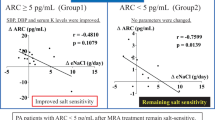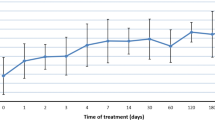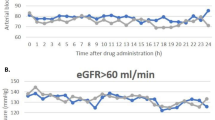Abstract
DURING the study of the mechanism of chroni congestive heart failure and other œdematous states it became more evident that there is need for a better understanding of the pharmacodynamics o mercurial diuretics. Investigations have been carried out with the use of radioactive mercury incorporated in a mercurial diuretic, 'Mercuhydrin' (sodium sal of methoxyoximercuripropylsuccinylurea with theo phylline, prepared in this laboratory by Messrs. H Krahnke, E. Sprengler and D. Kaestner through the courtesy of Dr. H. L. Daiell of Lakeside Laboratories Milwaukee, Wisconsin, with the use of mercury 203–205 from the A.E.C. Oak Ridge Operations), in order to observe for a period of 100–180 min. the concentration-time course of the isotope in the plasma of man after intravenous injection.
This is a preview of subscription content, access via your institution
Access options
Subscribe to this journal
Receive 51 print issues and online access
$199.00 per year
only $3.90 per issue
Buy this article
- Purchase on Springer Link
- Instant access to full article PDF
Prices may be subject to local taxes which are calculated during checkout
Similar content being viewed by others
Author information
Authors and Affiliations
Rights and permissions
About this article
Cite this article
RAY, C., THREEFOOT, S., BURCH, G. et al. Regression of a Radioactive Mercurial Diuretic from the Plasma of Man. Nature 163, 640–641 (1949). https://doi.org/10.1038/163640a0
Issue Date:
DOI: https://doi.org/10.1038/163640a0
Comments
By submitting a comment you agree to abide by our Terms and Community Guidelines. If you find something abusive or that does not comply with our terms or guidelines please flag it as inappropriate.



